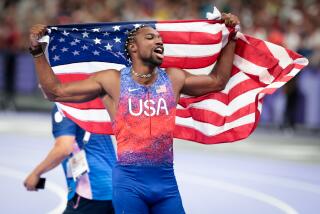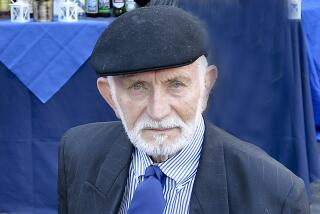This Wasn’t Just Another Country Mile
- Share via
Four laps, four minutes, one mile. So simple, so tidy, yet so unattainable until a rainy evening 50 years ago today, when Roger Bannister, a 25-year-old medical student, became the first person to break the athletic equivalent of the sound barrier.
“The four-minute mile had a beauty about it, a symmetry,” Norris McWhirter, a track and field statistician and founder of the “Guinness Book of World Records” once said. “If you said you were running 1,760 yards in 240 seconds, people would have yawned.”
For the record:
12:00 a.m. May 7, 2004 For The Record
Los Angeles Times Friday May 07, 2004 Home Edition Main News Part A Page 2 National Desk 1 inches; 39 words Type of Material: Correction
“Guinness Book of Records” -- An article in Thursday’s Sports section about runner Roger Bannister said that Norris McWhirter was the founder of the “Guinness Book of Records.” McWhirter was co-founder of the book with his twin brother Ross.
Australian John Landy had run 4 minutes 2 seconds several times and referred to the four-minute barrier as a psychological “cement wall.” Some doctors and scientists theorized that lungs would burst and muscles would tear before the finish line.
On May 6, 1954, at Oxford, England, in front of curious students, track fans and reporters estimated at no more than 2,000, Bannister proved he could run through that wall by clocking 3:59.4.
“I was a person in the right place at the right time,” Bannister, 75, has said of breaking a standard that had been dreamed about for more than a century. “It was a stroke of luck whether it was [American Wes] Santee, Landy or me who got there first.”
Bannister’s world record lasted only six weeks, until Landy lowered it to 3:58.0. Hundreds have since charged through the opening first made by Bannister, with the current world record of 3:43.13 set by Morocco’s Hicham El Guerrouj in 1999. Steve Scott, who set the U.S. record of 3:47.69 in 1982, broke the four-minute barrier a record 136 times over a 17-year span.
Still, a recent poll by the BBC named Bannister’s four-minute mile as the greatest achievement in sports history.
“Had it happened in Hungary, it might not have been such a big deal,” Olympic historian David Wallechinsky said. “They would have been more interested in a 1,500-meter world record.” The four-minute mile “is very much an English-language experience. It was an English distance, run by an Englishman. And Bannister has written so beautifully about it. And you had McWhirter there.
“Where does it fit in terms of athletic achievement? I can’t think of an equivalent today. Track and field is such a universal sport. When Vladimir Salnikov swam the 1,500 meters in under 15 minutes [at the 1980 Olympics], the swimming world was excited. When guys started hitting 60 home runs in a season, that was exciting, but they’re taking drugs and, besides, baseball is not a universal sport.”
Wallechinsky says he eagerly awaits the first marathon run in less than two hours but wonders, “Will the world pay as much attention if it’s done by a Moroccan or an Ethiopian as opposed to a British medical student?”
Scott, now the track and cross-country coach at Cal State San Marcos, agreed that the mile run held a special allure for track fans, and no mile grabbed them like Bannister’s.
“You have to remember what it was like then,” said Scott, who first broke the four-minute barrier in 1977 while competing for UC Irvine. “Running was strictly an amateur sport. People bought their own shoes. Coaching was limited. Today, if they were trying to run the first four-minute mile it would be a made-for-TV show broadcast throughout the world. The winner would be doing a Pepsi commercial.
“Bannister just wanted to break four minutes.”
In fact, Bannister retired from competitive running after the 1954 season without an Olympic medal, one life ending but another just beginning.
“I had always wanted to become a neurologist, which is one of the most demanding vocations in medicine,” Bannister said in an interview with an English journalist last week. “Where do you stop, after all, with the brain? How does it function? What are its limits? The work seems unending.”
Bannister approached running with a similar curiosity. His assault on the four-minute mile was well-planned, well-rehearsed and well-executed.
In his earliest years at Oxford, Bannister showed little in the way of brilliance on the track, barely breaking the five-minute barrier in 1946. But he improved dramatically to finish fourth in the 1,500 meters at the 1952 Olympics.
In December 1953, with his personal best at 4:02, Bannister ran a set of 10 440-yard runs at 66 seconds each, with a two-minute rest period. By April 1954, he had improved to 59 seconds for each of the 440s.
The annual meet between Oxford and the British Amateur Athletic Assn. was three weeks away. Bannister and his training partners, Chris Brasher and Chris Chataway, would make their attempt then and there.
“My whole body would grow nervous and tremble,” Bannister wrote in his recently re-released book, “The Four-Minute Mile,” of the days leading up to the meet. “I ran the race over in my mind. Then I would calm myself and sometimes get off to sleep.”
Bannister made his customary patient rounds at a London hospital on the morning of May 6, then sneaked away to sharpen his track spikes on a grindstone in a laboratory. A co-worker wondered, “You don’t really think that’s going to make any difference, do you?”
Later, Bannister took the train to Oxford, lunched with college friends and hoped the wind would cease blasting its way across England. The plan was to make a final decision on the record assault by 5 p.m., an hour before the race was to begin. By 5:15, a rain shower had fallen and the wind began to ease.
“The attempt was on,” Bannister would later write. “There was complete silence on the ground [then] a false start. I felt angry that precious moments during the lull in the wind might be slipping by. The gun fired a second time.”
Brasher charged into the lead, with Bannister tucked safely behind. They passed one lap of the 440-yard cinder track at Iffley Road in 57.5 seconds and Bannister believed they were going too slow. “Faster,” he shouted at Brasher. They covered 880 yards in 1:58 and Chataway soon took over the pacing duties.
At the 1,320-yard mark, Bannister’s time was 3:00.7. He sprinted past Chataway about 300 yards from the finish.
“I had a moment of mixed joy and anguish, when my mind took over,” Bannister wrote of the final lap. “I felt the moment of a lifetime had come. There was no pain, only a great unity of movement and aim. The world seemed to stand still, or did not exist. The only reality was the next 200 yards of track under my feet. The tape meant finality -- extinction perhaps.
“Those last few seconds seemed never-ending. The faint line of the finishing tape stood ahead as a haven of peace. The arms of the world were waiting to receive me, if only I had reached the tape without slackening my speed. I leapt at it like a man taking his last spring to save himself from the chasm that threatens to engulf him.
“My effort was over and I collapsed almost unconscious, with an arm on either side of me. It was only then that real pain overtook me. I felt like an exploded flashlight with no will to live; just existing in the most passive physical state without being quite unconscious.”
McWhirter, who died last month, was the meet’s announcer and received word from head timekeeper Harold Abrahams, the 1924 Olympic champion in the 100 meters whose story was told in the film “Chariots of Fire.”
“Results of one mile,” McWhirter told the crowd. “Time: 3 minutes.... “
“The rest was lost in the roar of excitement,” Bannister later wrote. “I grabbed Brasher and Chataway, and together we scampered round the track in a burst of spontaneous joy. We had done it -- the three of us.”
*
(BEGIN TEXT OF INFOBOX)
Chipping Away
The progression of the record for the mile, since the four-minute barrier was broken:
*--* 3:59.4 Roger Bannister, Britain 1954 3:58.0 John Landy, Australia 1954 3:57.2 Derek Ibbotson, Britain 1957 3:54.5 Herb Elliott, Australia 1958 3:54.4 Peter Snell, New Zealand 1962 3:54.1 Snell 1964 3:53.6 Michel Jazy, France 1965 3:51.3 Jim Ryun, United States 1966 3:51.1 Ryun 1967 3:51.0 Filbert Bayi, Tanzania 1975 3:49.4 John Walker, New Zealand 1975 3:48.95 Sebastian Coe, Britain 1979 3:48.8 Steve Ovett, Britain 1980 3:48.53 Coe 1981 3:48.40 Ovett 1981 3:47.33 Coe 1981 3:45.32 Steve Cram, Britain 1985 3:44.39 Noureddine Morceli, Algeria 1993 3:43.13 Hicham El Guerrouj, Morocco 1999
*--*
More to Read
Go beyond the scoreboard
Get the latest on L.A.'s teams in the daily Sports Report newsletter.
You may occasionally receive promotional content from the Los Angeles Times.






